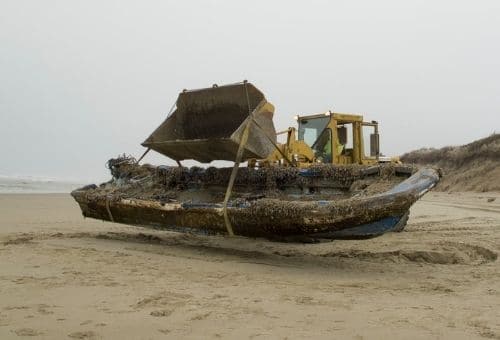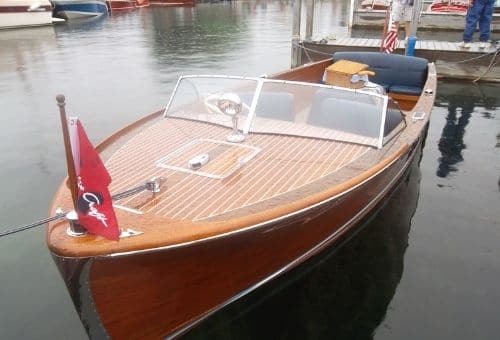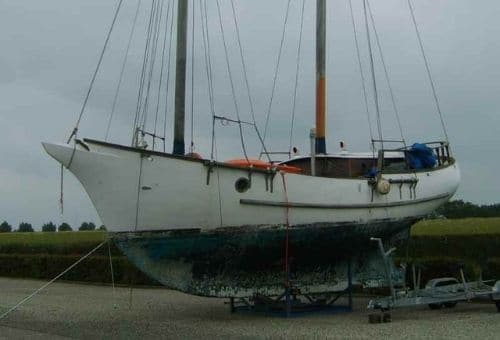The longevity of a boat depends mainly on the type of material, if it’s in saltwater or freshwater, and how well you maintain it. However, after analyzing all the different kinds of boats, here is how long they last on average:
Most boats that spend their time in fresh water last around 15-30 years, while boats in salt water last 10-25 years and require much more maintenance. However, some boats may last 5-75 years depending on the material used and maintenance that’s done.
The boat’s engine will probably die before the boat itself. Boat gas engines last around 1,500 hours on average, and diesel’s last around 5,000 hours (source). This equals about 15-25 years for the gas and 50-100 years for diesel, depending on how often you use your boat.
How long do boats last based on material
One of the most significant factors determining a boat’s lifespan is the material used to make the boat. This includes fiberglass, aluminum, wood, steel, and ferro-cement. So after gathering data, here’s the average lifespan for each boat material:
| Boat Material | Average Fresh Water Lifespan | Average Salt Water Lifespan |
|---|---|---|
| Fiberglass | 15-30 years | 10-30 years |
| Aluminum | 15-35 years | 5-25 years |
| Wood | 15-25 years | 10-25 years |
| Steel | 25-75 years | 20-50 years |
| Ferro-cement | 10-60 years | 10-40 years |
If well maintained, any boat could last a lifetime. However, each material requires different kinds of maintenance. For example, aluminum is well known for needing the least amount of maintenance while still being able to last very long. So later in this article, I will explain what you’ll need to know for each material type.
What boats last the longest based on brand?
The brand from which your boat was built is also another significant factor in determining its lifespan. Here’s my list for the top boat brand that will last the longest:
- Bosten Whaler
- Grady-White
- Bertram
- Mastercraft
- Viking Yachts
- Sea ray
- Lund
- Tracker
All of these boats could literally outlive you if well maintained. Below I will explain how to properly maintain your boat based on its material.
Fiberglass boats

Fiberglass is one of the most popular boat materials used today. Their durable, affordable, and resistant to saltwater corrosion. The most common fiberglass boats are jet skis, ski boats, fishing boats, and cabin cruisers.
How long do fiberglass boats last?
Fiberglass boats used in fresh water last 15-30 years on average, and 10-30 years in salt water. Because fiberglass is susceptible to UV damage, the most significant factor to extending their life is protecting them from the sun. This includes covering them and waxing the fiberglass often.
Pros and cons of fiberglass boats
Tips to extend the life of a fiberglass boat
- Always cover your boat up when not in use. The sun damages fiberglass, so getting your boat in the shade as much as possible will ensure a long-lasting life.
- Rinse and flush your boat and engine with fresh water after saltwater use. Although fiberglass doesn’t rust because of salt water like metal does, it’s still a good idea to get the salt water off and out of the engine. Using a special hose nozzle and a de-salter solution such as these on Amazon, you can easily get the salt off your boat and out of your engine.
- Wax your boat often. Wax not only makes your boat look good, but it also protects the fiberglass from the sun’s UV rays. It would be best if you waxed your boat at least once every other year; however, people who leave their boat in the sun all the time may have to wax more often.
- Use fenders. Fenders such as these (link goes to Amazon) will help prevent you from scratching your fiberglass and destroying the wax finish.
- Tie down your boat correctly. Another way to make sure you don’t scratch the fiberglass is by tying your boat down correctly. The longer the line is from your boat to the dock, the less likely it will snap. A strategy I use is crossing my lines.
Aluminum boats

Aluminum boats are well known for being affordable and lightweight. They generally cost 20-50% cheaper than similar fiberglass models. The most common boats that are aluminum are Jon boats, bass boats, and deep V fishing boats.
How long do aluminum boats last?
Aluminum boats used in fresh water last 15-35 years on average, and 5-25 years in salt water. Because aluminum is susceptible to corrosive damage, repaint a protective layer every four years or so. Also, always spray with fresh water and de-salt solution after saltwater use.
Pros and cons of aluminum boats
Tips to extend the life of an aluminum boat
- Make sure to repaint your aluminum boat every 4-7 years with corrosive resistant pain. Without a layer of paint, aluminum can rust especially if in salt water.If you need to get some protective paint, this one here on Amazon will work great.
- Learn how to weld. Fixing an aluminum boat can be pretty simple if you know how to weld. small holes and cracks can easily be fixed with basic welding.
- Use fenders. Due to the fact aluminum weighs so little, it’s also quite soft and prone to denting. So to avoid this, make sure you always use fenders when docking. You also don’t want to scratch off any of the protective paint.
Wood boats

Wood is not used much in modern boats; however, that does not mean it’s a bad material. Many wooden boats made over 50 years ago are still floating today. The most common kind of boats that are wooden are sailboats, rowboats, and rebuilt vintage boats.
How long do wood boats last?
Wood boats used in fresh water last 15-25 years on average, and 10-25 years in salt water. Wood boats require a lot of maintenance to avoid rotting, shrinking, or cracking. So, to make sure they last a while, you will be spending a lot of time and money on boat maintenance.
Pros and cons of wood boats
Tips to extend the life of a wood boat
- Use Fenders. Wood can get scratched very easily. Scratches cut through the varnish causing water to seep through and rot the wood. So fenders will help make sure you avoid that.
- Baby your boat. In order to keep your boat looking clean, regular polishing will need to be done. You also will need to revarnish every other year or so. This can get quite expensive.
Steel boats

Steel is mainly used for ships, yachts, and utility boats. It’s a solid and heavy material meant to last for many decades, if not centuries. However, corrosion is the main issue steel boats face, so make sure you reapply bottom paint every two years or so.
How long do steel boats last?
Steel boats used in fresh water last 25-75 years on average, and 20-50 years in salt water. Because steel is susceptible to corrosive damage, repaint a protective bottom layer every two years or so. You will also have to clean the hull often as most steel boats can’t come out of the water.
In 2012, roughly 1,250 ocean ships were broken down, and their average age was 26 years (source). This average has gone down in recent years with some ships lasting less than 10 years. The average is around 10-20 years. This is because many companies are getting paid to sell their ships for scrap metal (source).
Pros and cons of steel boats
Tips to extend the life of a steel boat
- Reapply bottom paint often. Get your hull checked out once a year to see if new bottom paint is required.
- Get rid of rust. If you find any rusted spots, sand it off and reapply paint. Rust indicates that the boat is ready for a new paint job.
Ferro-cement boats

Ferro-cement is a unique material used to make boats that is not used very much in today’s world. It’s a very heavy material, mainly used for yachts and large sailboats. Although Ferro-cement is relatively easy to repair if scratched, it’s extremely hard to repair if it’s cracked.
This and the fact that many were built in a DIY style makes many wary about buying them. However, if you get one built correctly, ferr-cement can be just as good as any other material out there.
How long do ferro-cement boats last?
Ferro-cement boats used in fresh water last 10-60 years on average, and 10-40 years in salt water. The lifespan varies so much because the build quality of ferro-cement also varies a lot. Many are built in a poor DIY style, while others were made professionally.
Pros and cons of ferro-cement boats
Tips to extend the life of a ferro-cement boat
- Make sure you buy one that’s made well. Many ferro-cement boats are made very poorly because many of them were made by individuals and not professional companies. So this means the quality varies widely.
- Become a trained captain. Although it’s good to make sure you know what you’re doing with any kind of boat, it’s more important for a ferr-cement boat captain. Due to the heavy nature of the material, it’s hard to dock. Also, if you were to crack the hull, the boat is very hard to rebuild.
Tips to extend the life of all boats
Click here to check out the full article I wrote on this topic. Otherwise, here are some of the most popular tips to extend the life of any boat:
- Always cover your boat up when you’re not using it. Harmful UV rays from the sun damage your boat. The exterior of your boat has wax layers protecting it from these rays that need to get replaced every year or so. Many people forget that the interior gets affected by UV rays as well. Check out this upholstery UV protector on Amazon.
- Clean your boat frequently. According to boatingvalley.com, you should clean your boat at least once every two weeks. This link here will send you to an Amazon cart full of everything you’ll need to clean your boat properly.
- Rinse your boat and flush the engine after every salt water use. Cleaning your boat is extremely important for saltwater boaters because saltwater corrodes boat material. You don’t always have to use soap, but rinse your boat with fresh water and a de-salter solution after every use. You can get this desalter solution and a hose nozzle to use it by clicking this Amazon link.
- Do proper engine maintenance. Winterizing, oil changes, and flushing saltwater out are the bare minimum engine maintenance that should be done regularly. Oil changes should be done at least once every year. Check out this article to learn more about boat maintenance.
What wears out on a boat?
Many different parts of a boat wear out. This is why preventative maintenance such as waxing the hull and flushing the engine with de-salter is so important. Below I listed all the things that wear out on a boat, starting with the first thing that usually wears out and ending with the last.
1. Battery
The battery is usually the first thing that wears out in your boat. You’ll need to replace it every 3 to 5 years. However, Lithium-ion batteries such as this one on Amazon can last over 10 years. If you want to see more about how to extend the life of your battery, check out this article I wrote.
2. Impeller
The impeller usually needs to get replaced every 5 years or 300 hours (source). So if you notice your engine overheating, it may be the impeller causing the issue. A damaged impeller allows less water in to cool down your engine.
3. Propeller
Time usually doesn’t damage propellers as they are very corrosive resistant; however, rocks do. We don’t all captain perfectly, so it’s very common that we may accidentally chip or dent our propellers on rocks.
If you notice lower than usual fuel efficiency, slower speeds, or a bumpy ride, it may be because of a broken propeller. Fortunately, these can be easily replaced and don’t cost a lot of money.
4. Carpet and Upholstery
Carpet, Seats, steering wheels, etc., tend to wear out halfway through your boat’s life if they are not maintained well. In order to maintain them well, you must clean and cover them from the sun. This upholstery UV protector on Amazon works great to avoid any UV damage.
5. Engine
Engines usually break before your hull. However, changing the oil every season and doing basic maintenance will help ensure it lasts as long as possible.
6. Hull
The last thing that wears out on a boat is the hull. Everything can be replaced except for the hull, so it’s the most important thing to maintain properly. Cleaning, rinsing, and waxing are things that must be done to maintain the hull.
The biggest enemy of your hull’s lifespan is the water (corrosion damage) and the sun (UV damage).
How many hours is a lot for a boat?
The main concern with a boat with many hours is its engines. Even if you do a lot of preventative maintenance, engines will always eventually give your problems. So as stated earlier in the article, here is the average boat engine lifespan:
Boat gas engines last around 1,500 hours on average, and diesel’s last around 5,000 hours (source). People generally use their boats around 75-150 hours a season, which equals 10-20 years for gas boats and 33-67 years for diesel. However, many engines will need to get repairs before this limit is reached.
So, gas boats that have over 1,500 hours on their engines and diesel’s with 5,000 are considered to be beyond the expected lifespan. Gas engines with over 1,000 hours and diesel’s with over 3,000 hours are considered a lot of hours, but may still have life in them.
If you want to see more about boat engines and how long they last, read this article I wrote by clicking here.
Signs it’s time to get rid of your boat
Even if your boat can still float and is in working condition, sometimes it may be best to get rid of it. Boats can be a huge liability, especially if you need engine repairs. So, here are the signs that it’s time to get a new boat:
- Constant engine problems. If you’re spending more time and money repairing the engine than what seems reasonable, you should look at selling your boat. Sometimes it might be better to put that money from boat repairs into a new boat instead.
- Don’t have the time to maintain it. Many old boats will need a lot of time and care in order for them to continue running smoothly. Waxing, repainting, oil changes, and basic engine maintenance are a few of the basic maintenance tasks that need to get done.
Is it worth it to buy an old boat?
Although many boats only last a finite time, they will last very long if regular maintenance is done. So this is why if you know the previous owner has done a lot of regular maintenance on the hull and engine, it’s definitely worth it to buy an old boat.
Even a 20-year-old boat could have decades left in it with a proper engine rebuild or replacement.
Do boats hold their value well over time?
Boats depreciate similar to how cars do. Expect them to lose about 10-15% of their value in the first year of use, 20-30% by the fifth, and 30-40% by the tenth year of use. After the tenth year, depreciation will generally slow down significantly.
Check out this article here to learn more about this question.
How much does saltwater affect the lifespan of a boat?
Saltwater corrodes metal five times faster than fresh water does (source). So making sure you de-salt after every use is very important. For boats that can’t leave the water, making sure you repaint the hull when needed will ensure you don’t experience any rust.
Saltwater and freshwater boats can last the same amount of time if perfectly maintained. However, this usually doesn’t happen, so expect to lose about 5-10 years of boat lifespan for saltwater boats.
- What Is The Cheapest Way To Store A Boat? - February 28, 2023
- Do Boats Need Bottom Paint? (Uncovering the Truth) - February 2, 2023
- How Much Is Bass Boat Insurance? (Real Quotes) - January 18, 2023

